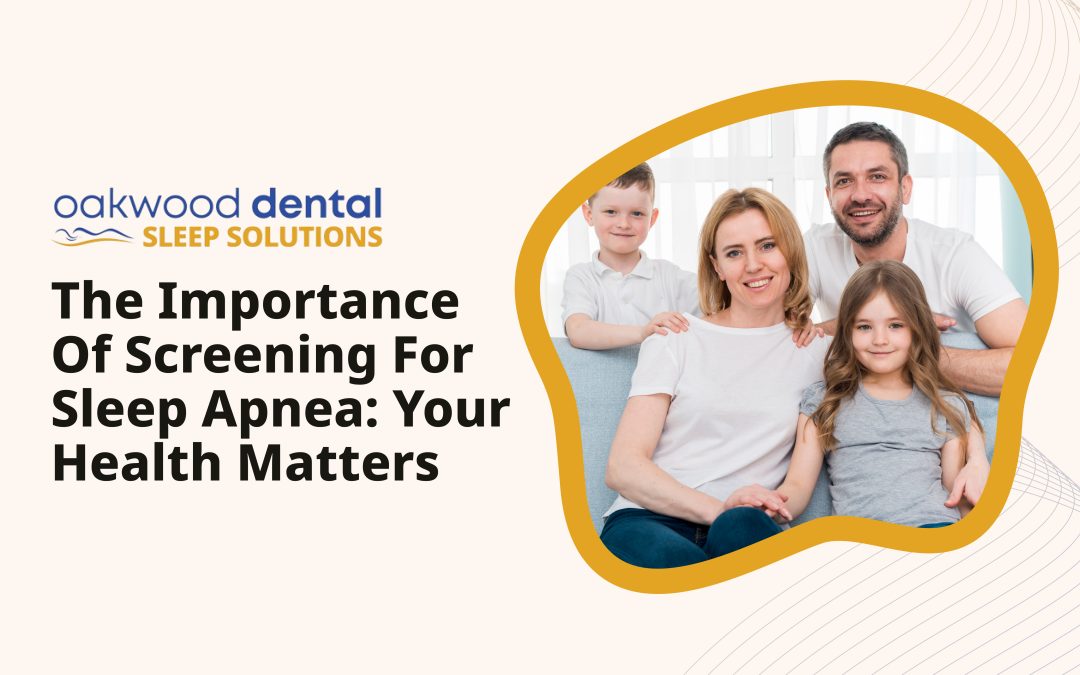Sleep apnea is a serious sleep disorder that affects millions of people worldwide. It happens when your breathing stops and starts repeatedly during sleep, which can cause health problems if not treated. Screening for sleep apnea is really important to find it early and treat it properly. Let’s look at why it’s so important to get checked and how it can affect your health. Understanding the risks and taking action can make your life much better and prevent serious health issues.
Key Takeaways
| Aspect | Importance |
|---|---|
| Early Detection | Crucial for preventing serious health complications |
| Health Risks | Untreated sleep apnea can lead to heart problems, diabetes, and more |
| Symptoms | Include loud snoring, feeling sleepy during the day, and headaches in the morning |
| Screening Process | Involves checking your health, physical exam, and sleep studies |
| Treatment Options | Include CPAP machines, mouth devices, and lifestyle changes |
Understanding Sleep Apnea
Sleep apnea happens when your breathing stops and starts many times while you’re sleeping. These pauses can last several seconds and might happen hundreds of times each night, messing up your sleep and the oxygen your body gets. There are two main types of sleep apnea:
- Obstructive Sleep Apnea (OSA): The most common type, caused when your airway gets blocked, usually when the soft part at the back of your throat collapses during sleep
- Central Sleep Apnea: Less common, happens when your brain doesn’t tell your muscles to breathe, often because of problems with the part of your brain that controls breathing
Some people have both types, which is called complex sleep apnea. Knowing which type you have is important for getting the right treatment.
Why Screening for Sleep Apnea Matters
Getting checked for sleep apnea is really important because many people don’t know they have it. In fact, up to 80% of people with moderate to severe sleep apnea don’t know they have it. This is worrying because untreated sleep apnea can cause serious health problems. Finding it early through screening can lead to quick treatment and prevent serious health issues. It can also make you feel much better during the day and reduce the risk of accidents caused by being too sleepy.
Many people who suffer from sleep apnea are completely unaware of their condition, which is why taking a proactive approach to screening is so important. Early detection is key to protecting your health and preventing the serious complications that can come with untreated sleep apnea.
Health Risks of Untreated Sleep Apnea
If sleep apnea isn’t treated, it can lead to many health problems that affect you now and in the future. The lack of oxygen and broken sleep can affect many parts of your body. Untreated sleep apnea is associated with an increased risk of several serious conditions, making early diagnosis and treatment crucial for your overall health. Some of the biggest health risks include:
- High blood pressure: Sleep apnea can cause high blood pressure or make it worse
- Heart disease: You’re more likely to have heart attacks or other heart problems
- Stroke: Sleep apnea increases your risk of having a stroke
- Type 2 diabetes: It can affect how your body uses insulin and processes sugar
- Depression: Not sleeping well can make you feel sad or anxious
- More accidents: Being sleepy during the day can make you more likely to have car accidents or get hurt at work
- Daytime fatigue: Constant tiredness that affects your daily activities
- Poor concentration: Difficulty focusing at work or during daily tasks
- Decreased quality of life: Overall reduction in your enjoyment and participation in daily activities
Untreated sleep apnea can also cause liver problems, weight gain, and make it harder to recover from surgery. All these risks show why it’s so important to find and treat sleep apnea early.
Signs and Symptoms of Sleep Apnea
Knowing the signs of sleep apnea is the first step to getting checked. Sometimes your bed partner might notice these more than you do. Not everyone with sleep apnea has all these symptoms, and they can be mild or severe. Common symptoms include:
- Loud snoring: Often very loud and happens every night
- Gasping or choking during sleep: Your partner might notice you stop breathing
- Feeling very sleepy during the day: Even if you think you slept all night
- Headaches in the morning: Often because you didn’t get enough oxygen while sleeping
- Trouble focusing: Problems with memory or thinking clearly
- Mood changes: Feeling irritable or grumpy
- Dry mouth or sore throat when you wake up: From sleeping with your mouth open
- Restless sleep: Moving around a lot or waking up often
- Night sweats: Sweating a lot while you sleep
- Less interest in sex: Sleep apnea can affect your hormones and energy
If you or someone you know has these symptoms, it’s important to talk to a doctor about getting checked for sleep apnea. Finding and treating it early can stop symptoms from getting worse and reduce health risks.
Self-Assessment: The Epworth Sleepiness Scale
One of the most helpful tools for identifying potential sleep apnea is the Epworth Sleepiness Scale. This simple questionnaire helps measure your level of daytime sleepiness, which is often a key indicator of sleep disorders like sleep apnea. The scale asks you to rate how likely you are to fall asleep in various everyday situations.
To use this scale, think about your usual way of life in recent times. Even if you haven’t done some of these activities recently, try to imagine how they would affect you. Rate each situation using this scale:
- 0 – Would never nod off
- 1 – Slight chance of nodding off
- 2 – Moderate chance of nodding off
- 3 – High chance of nodding off
Rate how likely you are to nod off or fall asleep in these situations:
| Situation | Your Score (0-3) |
|---|---|
| Sitting and reading | ___ |
| Watching TV | ___ |
| Sitting, inactive, in a public place (e.g., in a meeting, theater, or dinner event) | ___ |
| As a passenger in a car for an hour or more without stopping for a break | ___ |
| Lying down to rest when circumstances permit | ___ |
| Sitting and talking to someone | ___ |
| Sitting quietly after a meal without alcohol | ___ |
| In a car, while stopped for a few minutes in traffic or at a light | ___ |
| Total Score | ___ |
Understanding Your Score: Add up your points to get your total score. A score of 10 or greater raises concern and suggests you may need to get more sleep, improve your sleep practices, or seek medical attention to determine why you are sleepy. This could be an important indicator that you should be evaluated for sleep apnea.
The Screening Process
Getting checked for sleep apnea usually involves a few steps. Doctors use these steps to gather information about how you sleep, your health history, and your physical condition. This helps them make the right diagnosis and create a good treatment plan. The screening process usually includes:
- First check-up: Your doctor will ask about your symptoms and health history. They might ask you to fill out a questionnaire about how sleepy you feel during the day.
- Physical exam: The doctor will check your throat, nose, and mouth for anything that might block your breathing. They’ll also check your blood pressure and weight, as being overweight can increase your risk of sleep apnea.
- Sleep study: This is the best way to diagnose sleep apnea. It can be done in a sleep lab or at home with special devices. A sleep study shows detailed information about your sleep patterns, breathing, heart rate, and oxygen levels throughout the night.
Types of Sleep Studies
There are two main types of sleep studies used to diagnose sleep apnea:
- Polysomnography (PSG): This is done in a sleep lab. It’s very detailed and measures brain waves, heart rate, breathing, and other body functions during sleep. It’s considered the best way to diagnose sleep apnea.
- Home Sleep Apnea Test (HSAT): This is a simpler test you can do at home. It measures your breathing and blood oxygen levels. It’s not as detailed as a PSG, but it’s more convenient for some people.
Your doctor will decide which type of sleep study is best for you based on your symptoms and health condition.
Treatment Options for Sleep Apnea
If you’re diagnosed with sleep apnea, there are several ways to treat it. The best treatment depends on how severe your sleep apnea is, your overall health, and what you prefer. Your doctor will work with you to find the best treatment plan. Common treatments include:
CPAP Therapy: The Gold Standard
Continuous Positive Airway Pressure (CPAP) therapy is considered the gold standard treatment for sleep apnea. A CPAP machine works by delivering a steady flow of air through a mask to keep your airway open during sleep. This is the most common and effective treatment for moderate to severe sleep apnea. You wear a mask while sleeping that blows air into your throat to keep your airway open.
While CPAP therapy is highly effective, some patients may find it difficult to tolerate or use the machine consistently. If you’re struggling with CPAP therapy, don’t give up – there are other options available.
Other Treatment Options
- Lifestyle Changes: Losing weight, exercising regularly, and avoiding alcohol before bedtime can help manage mild cases. Other changes might include sleeping on your side instead of your back and quitting smoking.
- Surgery: In some cases, surgery might be recommended to fix physical problems that cause sleep apnea.
Conclusion: Your Health Matters
Getting checked for sleep apnea is really important for your overall health. By finding and treating sleep apnea early, you can prevent serious health problems and feel much better. Treating sleep apnea doesn’t just help you sleep better; it can also improve your heart health, how your body processes sugar, your mood, and how long you live.
Remember, good sleep is crucial for good health, and treating sleep apnea is an important part of taking care of yourself. It might take some effort to get used to treatment, but the benefits are huge. Many people with sleep apnea feel much more energetic, happier, and healthier after getting treatment.
Don’t ignore signs of sleep apnea. If you’re having symptoms or are worried, talk to a doctor. Take the Epworth Sleepiness Scale assessment, and if your score is 10 or higher, consider scheduling a consultation with a sleep medicine specialist. Your health is important, and taking action now can lead to better sleep and a healthier future. By taking care of your sleep health, you’re investing in your overall well-being for years to come.


